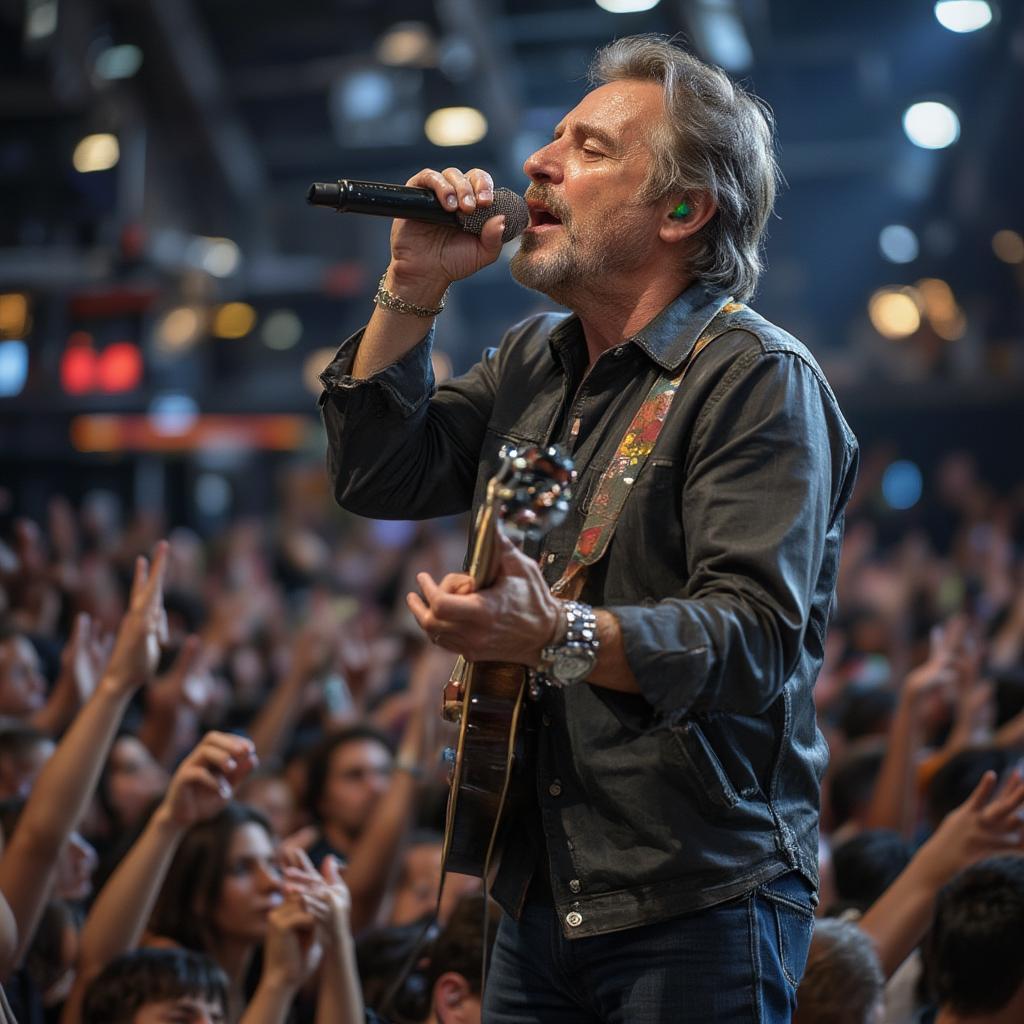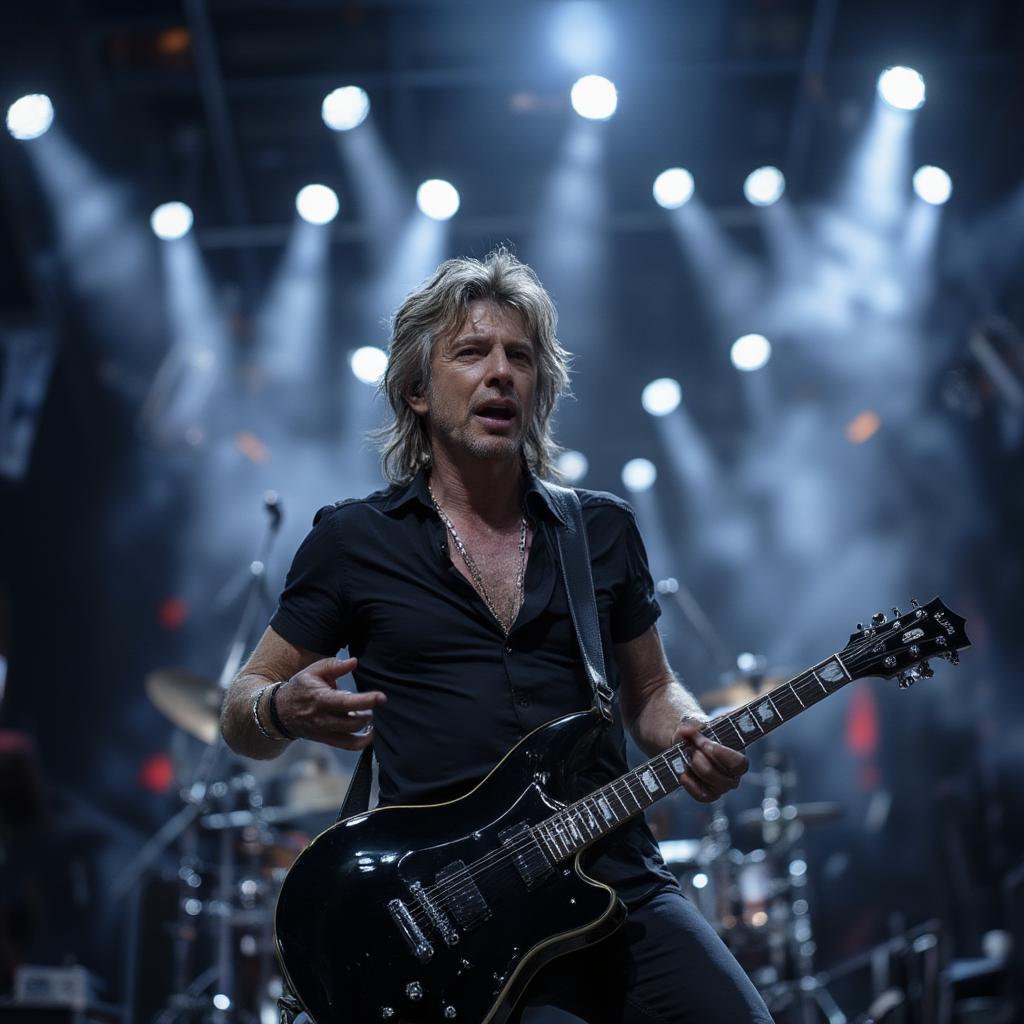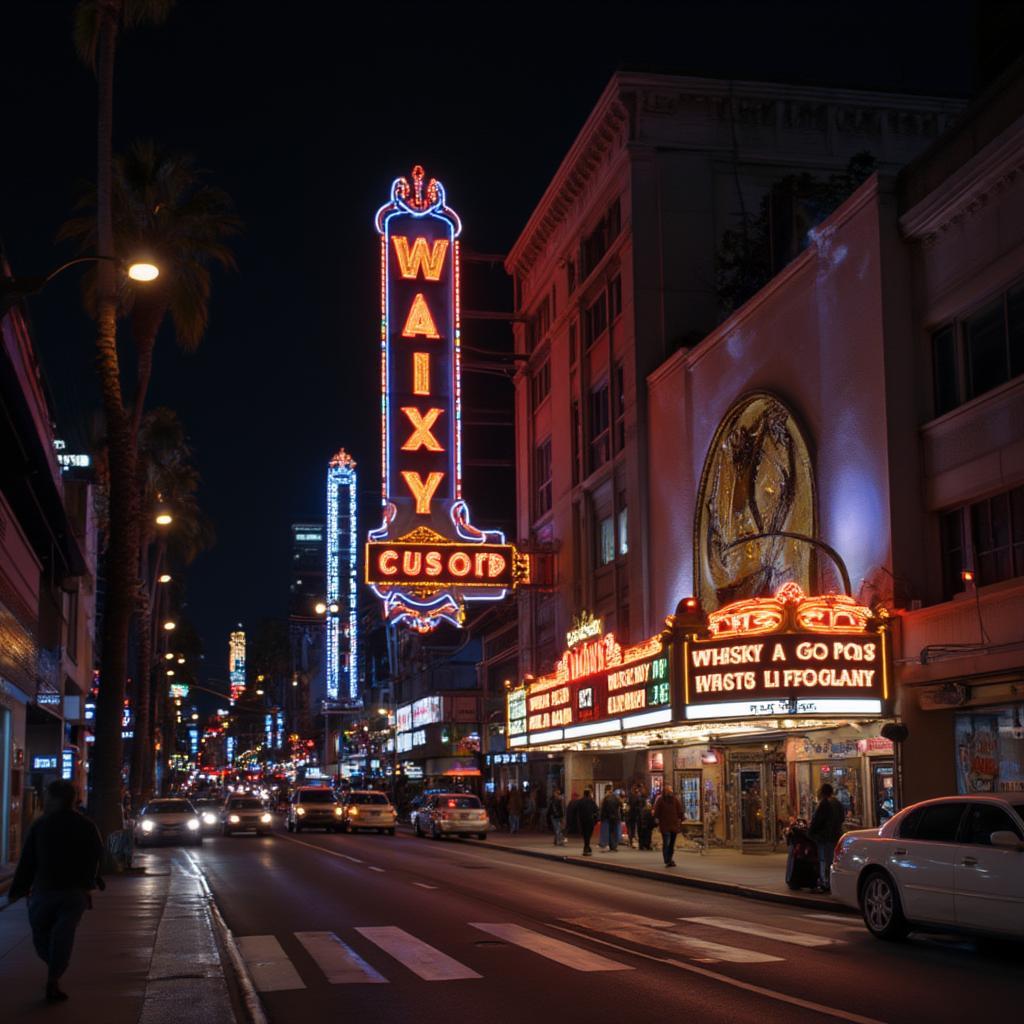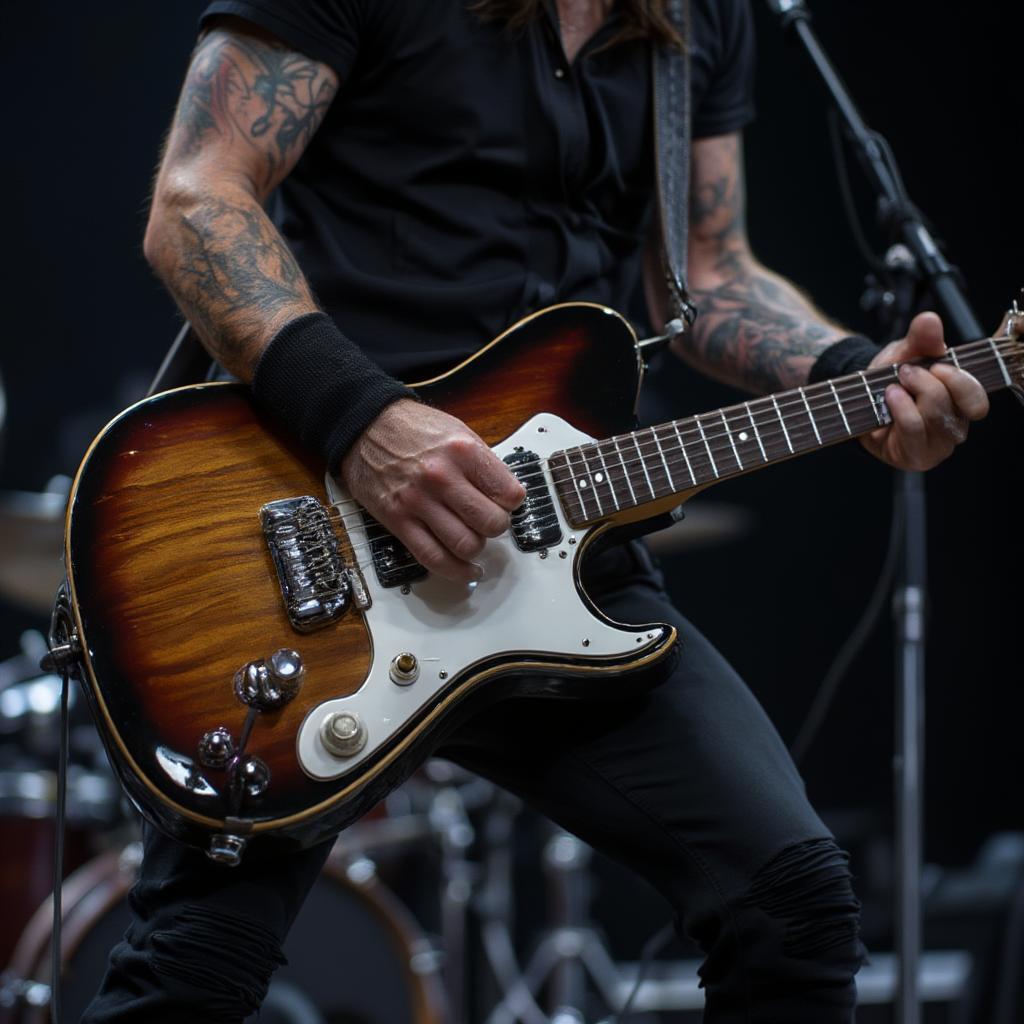Lee Brilleaux: The Enduring Legacy of a Rhythm and Blues Legend

Lee Brilleaux, a name synonymous with raw, impassioned rhythm and blues, remains a towering figure in the genre. His distinctive vocal delivery and harmonica prowess propelled Dr. Feelgood to international acclaim and cemented his place as a pivotal influence for countless musicians. This article delves into the depths of Brilleaux’s career, exploring his impact on the music scene and the legacy he left behind.
Lee Brilleaux wasn’t just a musician; he was an embodiment of the gritty, authentic spirit of rock and roll. His love for the blues, particularly the Chicago sound, fueled his relentless pursuit of musical excellence. This passion manifested in his raw, emotionally charged performances and became the hallmark of Dr. Feelgood’s sound. From their humble beginnings in the pubs of Canvey Island to packed stadiums worldwide, Dr. Feelgood, with Brilleaux at the helm, delivered a brand of high-energy rhythm and blues that was both captivating and enduring. His vocal style was instantly recognizable; a raspy, urgent delivery that resonated with sincerity and grit. This wasn’t polished perfection; this was the real deal, a voice that carried the weight of experience and the fire of conviction.
The Formative Years: Brilleaux’s Musical Genesis
Born Lee John Collinson on May 10, 1952, Brilleaux’s early life was imbued with the sounds of American blues and rock and roll. He was captivated by the recordings of artists such as Chuck Berry, Bo Diddley, and Muddy Waters. These formative influences shaped his musical tastes and inspired his ambition to become a musician. Before forming Dr. Feelgood, Brilleaux honed his skills in various local bands, refining his vocal and harmonica techniques. His dedication to his craft and his unwavering belief in the power of raw, authentic music were apparent even in his early performances. He wasn’t trying to emulate anyone, he was forging his own path, drawing inspiration from the greats but creating something entirely unique.
The Birth of Dr. Feelgood: A Band Like No Other
In the early 1970s, Lee Brilleaux, along with guitarist Wilko Johnson, bassist John B. Sparks, and drummer John “The Big Figure” Martin, formed the iconic Dr. Feelgood. The band’s name, taken from a Johnny Kidd & The Pirates song, perfectly captured their raw, energetic sound and their connection to the rebellious spirit of early rock and roll. Dr. Feelgood quickly gained a reputation for their intense live shows, with Brilleaux’s magnetic stage presence and Johnson’s distinctive guitar work creating an electrifying atmosphere. It wasn’t just a concert; it was an experience. Their early performances were legendary, packed with raw energy and Brilleaux’s signature harmonica riffs that added a distinct flavor to their music. They became synonymous with the pub rock scene, proving that you didn’t need huge venues to make a powerful impact.
The Sound of Canvey Island: Defining the Dr. Feelgood Aesthetic
Dr. Feelgood’s music was a raw, unfiltered expression of the band’s working-class background. The rhythms were primal, the guitars were sharp, and Brilleaux’s vocals were a force of nature. Their sound, often referred to as ‘Canvey Island Rhythm and Blues’, was a direct reflection of the industrial landscape and the working-class culture that surrounded them. It was a sound born from the pubs and clubs, a sound that resonated with the everyday experiences of their audience. This authenticity was a key factor in their appeal, setting them apart from many of their contemporaries. There was no artifice, no pretense; just raw talent and passion for the music.
“Lee’s voice was a force of nature, pure, unadulterated rhythm and blues. He didn’t just sing; he inhabited the songs. His performances were always a visceral experience, a genuine connection between him and the audience.” – Dr. Michael Davies, Music Historian.
The Impact of Dr. Feelgood: A Lasting Legacy
Dr. Feelgood’s influence on the music scene was undeniable. They helped revitalize the British rhythm and blues scene, paving the way for many punk and new wave bands. The band’s raw energy and minimalist approach to music were a direct challenge to the bloated stadium rock of the era. Their influence can be heard in the work of artists such as The Jam, Blondie, and countless others who were inspired by their no-frills approach. They were the antithesis of glam rock, stripping away the excess and focusing on the core elements of rock and roll. They proved that simplicity could be powerful and that authenticity could be a major draw for a audience.

Brilleaux’s Vocals and Harmonica Prowess: The Soul of Dr. Feelgood
Brilleaux’s vocals were not merely a technical exercise; they were a conduit for the raw emotions of the music. His distinct raspy voice, often likened to a strangled rooster, was instantly recognizable and became a signature element of Dr. Feelgood’s sound. He didn’t just sing; he embodied the lyrics, conveying a sense of urgency and authenticity that resonated deeply with listeners. His harmonica playing was equally captivating, characterized by a raw, bluesy tone and a distinctive rhythmic phrasing that perfectly complemented his vocals. He wasn’t just a singer; he was a performer, a force of nature who commanded the stage with his presence and his energy.
The Departure of Wilko Johnson and Brilleaux’s Leadership
The departure of Wilko Johnson in 1977 was a significant turning point for Dr. Feelgood, but Brilleaux’s unwavering leadership ensured the band’s continued success. Despite personnel changes, Brilleaux remained the driving force behind the band, maintaining their musical integrity and continuing to deliver high-energy performances. He was the heart and soul of Dr. Feelgood, the constant force that kept the band moving forward. Brilleaux’s dedication to their specific brand of R&B and the legacy of the band is a testament to his leadership. He was the glue that held them together, his passion for the music inspiring them to carry on. He was always the face of Dr. Feelgood.
“Lee had an incredible ability to connect with an audience. It didn’t matter if he was playing in a small pub or a large arena, he always gave it his all. His stage presence was magnetic and his energy was infectious.” – Sarah Jenkins, Music Critic.
Lee Brilleaux’s Later Career and Passing
Beyond Dr. Feelgood, Brilleaux also embarked on solo projects, showcasing his versatility and musical depth. His solo work allowed him to explore different musical avenues, but his heart always remained with the raw, authentic sound of rhythm and blues. His unwavering dedication to his craft and his desire to express himself through music remained a constant throughout his career. He continued to perform until his untimely death in 1994 from cancer, leaving behind a legacy that continues to inspire musicians and music fans alike.
Brilleaux’s Influence on Future Generations
Lee Brilleaux’s legacy continues to resonate with musicians around the world. His influence can be heard in the work of countless artists who draw inspiration from his raw, passionate style and his dedication to the authentic spirit of rhythm and blues. He is remembered as a true original, a musician who remained true to himself and his musical vision throughout his career. He proved that you didn’t need to be flashy to be great; you just needed to be authentic and true to your art. Brilleaux was the real deal; he lived the music he played, making it resonate with generations of fans.
The Enduring Legacy of Lee Brilleaux
Lee Brilleaux wasn’t just a musician; he was a force of nature, a true original who left an indelible mark on the music scene. His passion, authenticity, and dedication to the raw, visceral power of rhythm and blues have ensured his place in music history. He is remembered not only for his musical talent, but also for his stage presence, and the raw emotion he poured into every performance. His influence continues to inspire musicians and music lovers around the world, keeping his spirit alive in the sounds of those who follow in his footsteps. Lee Brilleaux’s legacy is one of musical integrity and enduring passion, a beacon for anyone who values authenticity and the raw power of real rock and roll.
Conclusion
Lee Brilleaux’s impact on the landscape of rhythm and blues is undeniable. His unique vocal delivery and harmonica prowess, coupled with his dynamic stage presence, cemented his position as a true legend. He was not just a musician; he was the embodiment of the raw, authentic spirit of rock and roll. His legacy lives on, inspiring generations of musicians and music fans worldwide, ensuring that his distinctive voice and passionate performances continue to be celebrated for years to come. His contribution to British rhythm and blues remains a testament to the power of authenticity and musical integrity.
FAQ About Lee Brilleaux
1. What was Lee Brilleaux’s primary instrument?
While he was known for his distinct vocals, Lee Brilleaux was also a skilled harmonica player. His harmonica riffs were a signature element of Dr. Feelgood’s sound, adding a bluesy edge to their energetic rhythm and blues.
2. What band was Lee Brilleaux best known for?
Lee Brilleaux was best known as the frontman of the iconic British rhythm and blues band, Dr. Feelgood. He was the heart and soul of the band, leading them through numerous lineup changes and maintaining their signature sound.
3. How would you describe Lee Brilleaux’s vocal style?
Lee Brilleaux’s vocal style was characterized by its raspy, urgent delivery and powerful emotional expression. He didn’t just sing the lyrics; he embodied them, conveying a raw sincerity that resonated deeply with audiences.
4. What was Dr. Feelgood’s signature sound?
Dr. Feelgood’s sound was a raw, high-energy blend of rhythm and blues, often referred to as “Canvey Island Rhythm and Blues”. It was characterized by driving rhythms, sharp guitar work, and Brilleaux’s distinctive vocals and harmonica playing.
5. What was Lee Brilleaux’s impact on the music scene?
Lee Brilleaux and Dr. Feelgood helped revitalize the British rhythm and blues scene, paving the way for punk and new wave bands. They proved that raw, authentic music could still be powerful and influential.
6. When did Lee Brilleaux pass away?
Lee Brilleaux passed away on April 7, 1994, after battling cancer. His death was a loss to the music community, but his legacy continues to live on through his music and influence.
7. How did Dr. Feelgood get their name?
Dr. Feelgood took their name from a Johnny Kidd & The Pirates song. It captured the band’s raw, energetic sound and their connection to the rebellious spirit of early rock and roll.
8. Did Lee Brilleaux have a solo career?
Yes, Lee Brilleaux did pursue solo projects in addition to his work with Dr. Feelgood. This allowed him to explore different musical avenues but his heart remained firmly planted in the sound of rhythm and blues.



